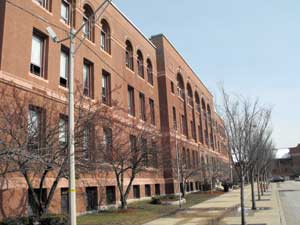
By Peta Jinnath Andersen
Somerville High is an Innovative School – and it has the award to show for it.
Earlier this week, the school was honored at the MassBio Annual Awards Luncheon at the Royal Sonesta Hotel in Cambridge. Awarded to “a Massachusetts High School that has distinguished itself through exemplary innovative biotechnology educational programming,” the Innovative School of the Year Award is a welcome recognition for Somerville High.
Since 2005, the school has worked with the MassBioEdFoundation, a non-profit “committed to supporting science and biotechnology education in Massachusetts through school programs, workforce training, and lifelong learning.” Somerville High School is also involved with the Life Science Career Development Initiative, a program that works to “inspire interest in life science careers and to integrate science instruction and career awareness in collaboration with community and industry partners.”
Chris Angelli, a teacher at Somerville High, used funding from a MassBioEd BioTeach grant to develop lab facilities–and two high-level biotechnology courses which allow students to get an idea of what it’s like to work in the biotech industry. A career component helps students research biotech companies, find internship opportunities, and learn what’s involved in creating their own biotech company.
BioTeach grants work to engage high schoolers “with hands-on lab experiences that inspire scientific curiosity,” and “provide professional development for biology teachers in biotech science.” The program also seeks to “enable every public high school in Massachusetts to teach biotechnology methods in its biology classrooms.”
And school officials at Somerville High say they are on-mission, using the grant to improve lab facilities and implementing two biotechnology courses.
“The course[s] [are] offered to high performing juniors and seniors each year.” Most, if not all, are enrolled in other AP courses,” Angelli said in an interview with MassBioEd. “This is a very rigorous course. I teach very high-end theory… I try to give the big picture and the whole story.”
But MassBioEd isn’t the school’s only partner. Working with Tufts University and MIT, students are exposed to both field work and college level teaching and resources. In “Getting the Dirt on Somerville,” a collaboration with Tufts, students isolate bacteria from locally collected soil-samples. DNA is then extracted from the bacteria and sent to be sequenced; when the sequence is returned, students use a national database, NCBI BLAST, to identify which bacteria they isolated. “These students would have a huge advantage moving into university, [already] being exposed to these foundation techniques during during high school,” says Sheryl Sturgess, Ph.D, a researcher at the Vaccine and Infectious Disease Organization at the University of Saskatoon. “The head start these students will receive will benefit them for their entire career.”
Not all projects are as academic sounding, though: in association with Tufts, students also perform experiments with a more real-world feel. Currently, these involve examining locally purchased soy products to see if they’ve been genetically modified, and using samples of their own mitochondrial DNA to learn more about their ancestors.












Reader Comments